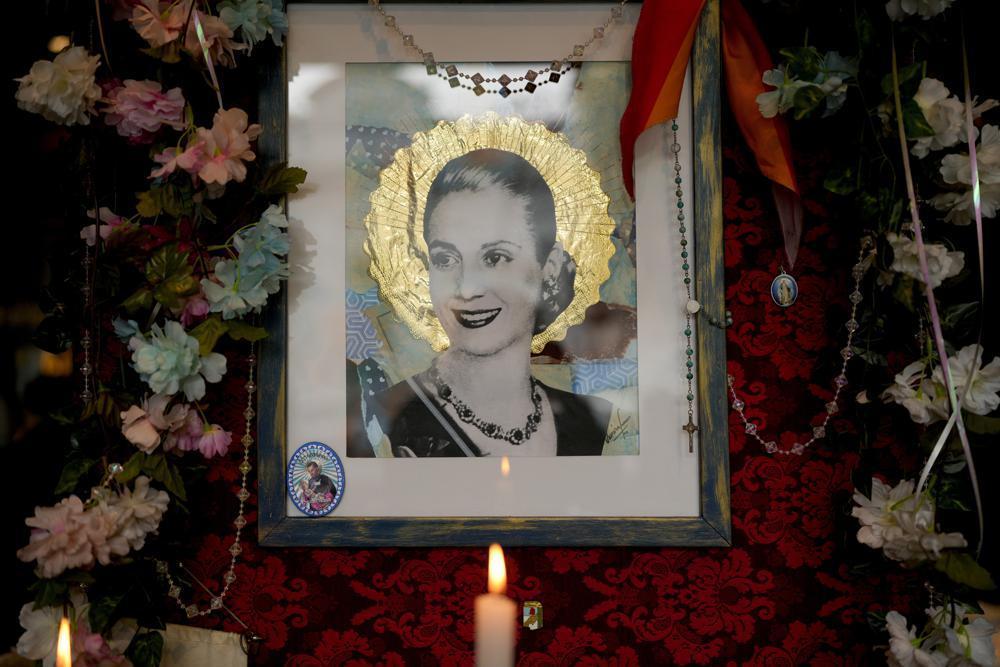
Maria Eva Noble says she is carrying out the legacy of her namesake as she labors in a soup kitchen in a working class neighborhood of Buenos Aires.
She was named after iconic Argentine former first lady Maria Eva Duarte de Peron, better known as Eva Peron, or Evita, who died 70 years ago Tuesday. The soup kitchen where Noble does volunteer duty in the Flores district gives daily lunches to about 200 people and is run by an organization that also carries the name of the late leader.
Though not related to Eva Peron, Noble says, “I carry Evita in my DNA.” And she is hardly the only one who feels this way.
Seven decades after her death, Evita continues to awaken passions in Argentina as her followers believe her image as a champion of the poor is more relevant than ever at a time when inequality and poverty are rising as the economy remains stagnated amid galloping inflation.
Evita has been the subject of countless books, movies, TV shows and even a Broadway musical but for some of her oldest, most ardent followers the connection with the actress turned political leader is much more personal.
Evita was born in a modest home in Los Toldos, a small rural town some 300 kilometers from the capital, where she moved to when she was 15 to pursue her dream of becoming an actress. A decade later, she met Juan Domingo Peron, a military officer who was a government official.
Evita was by his side when Peron won the 1946 presidential election and went on to take an unprecedented role as a powerful first lady, putting herself at the forefront of women’s rights causes, including suffrage that was approved a year later and setting up a foundation to help workers and the poor.
As much as Evita was loved, she was equally hated by many of the country’s wealthy and powerful who were wary of her growing popularity and influence.
Her time in the spotlight was intense but brief as she died of cervical cancer at age 33, which led to an outpouring of grief in the streets as the South American country went into mourning.
Peron ended up being elected president two more times and was the founder of a political movement - Peronism - that dominates Argentine political life to this day, with many leaders of disparate ideological views claiming loyalty to the former general.
“Peron was respected, he was obeyed - you either agreed with what he said or not. But Evita was loved or hated and ended up contributing a strong dose of emotion to Peronism,” said Felipe Pigna, a historian who has written extensively about the former first lady.
For some, that emotion has lived on.
“Eva is a character who bewitches,” said Alejandro Maci, director of new series “Santa Evita” that premiered on July 26 on Disney’s streaming services based on a 1995 novel by Argentine writer Tomas Eloy Martinez.
Peron and Evita continue to be the subject of criticism both within Argentina and abroad. Some, for example, say Evita used money from the state to carry out what she described as charitable works to build up her own image as a saintly figure and help her husband grow in popularity. Others also point to claims that the couple received money from the Nazis to help perpetrators of war crimes hide out in Argentina after World War II.
Cristina Alvarez Rodriguez, a great-niece of Evita who is now a minister in the Buenos Aires provincial government, said she is particularly moved by the number of “very young girls who have tattooed Evita on their skin” and now “have her as a guiding light.”
Many now are also yearning for a figure like Evita.
For some, the current government of President Alberto Fernandez, who describes himself as a Peronist, has strayed from those principles.
“The Argentine people feel betrayed. Peronism never came to starve the people, and that’s what is happening now,” said Mateo Nieto, who has photos of Peron and Evita in his pizza restaurant in the northern city of Posadas, near the border with Paraguay.
Nieto said that “the government that is in power calls itself Peronist, but it really isn’t Peronism.”
“We really miss someone like Evita, it would be great to have a leader like her in this time,” he said.